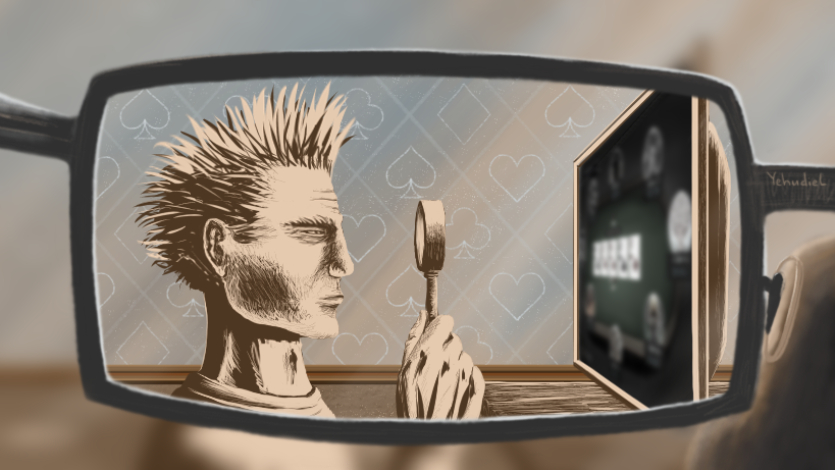When to Call a Time-Out: Poker Players and Eye Health

Poker players spend hours at the computer, like marathon runners pushing their limits. This can take a toll on their eyes, just like running can strain muscles. So, let’s talk about the risks, prevention, and when to seek help.
Does Screen Time Lead to Vision Loss?
Staring at screens for long periods, especially with a poorly set-up workspace, can indeed lead to vision problems. The main culprit is a disruption of accommodation – the eye’s ability to focus on objects at different distances.
One common issue is “habitual excessive accommodation” (HEA). This is like overworking a muscle – the eye’s focusing mechanism gets strained from constantly looking at close objects.
HEA often manifests as computer vision syndrome, with symptoms like:
- Heavy eyelids
- Gritty feeling in the eyes
- Eye strain
- Burning or itching
- Dryness or excessive tearing
- Increased blinking
- Blurred vision
Beyond the eyes, there can be headaches, neck/back pain, and fatigue.
For poker players, stress adds another layer of risk. It can raise blood pressure, leading to increased pressure within the eyes. This can cause headaches, eye discomfort, fatigue, irritability, nausea, redness, and focusing problems.
Knowing When to See the Eye Doctor
Only an ophthalmologist can diagnose eye problems and recommend proper treatment. Generally, healthy adults should get eye checkups every 2-3 years (18-39 years old) or annually (40+ years old).
However, poker players are not typical “healthy” individuals when it comes to eye strain and stress. Beyond the symptoms already mentioned, here are some red flags that warrant an immediate visit to the eye doctor:
- Eye pain, including around the eye socket, brows, and temples.
- Redness in the eyes or eyelids that doesn’t improve with rest or eye drops.
- Swollen eyelids
- Persistent intense itching
- Changes in light sensitivity
- Excessive tearing or discharge
- Narrowing of vision
- Blurred vision at any distance
- Seeing halos or auras around objects
- Floaters, spots, or streaks that don’t disappear after resting
- Recurring headaches in the forehead or temples
- Feeling of something stuck in the eye
- Any eye or eyelid injury (scratch, bump, swelling)
- Difficulty opening or closing eyelids
- Eyes feeling “stuck”
- Seeing flashes or sparks
- Blood spots on the eye that don’t go away after sleep or using drops.
If you experience any of these symptoms, don’t gamble with your vision. See a doctor for diagnosis and treatment.
Setting Up Your Poker Base: Protecting Your Eyes
The main cause of computer vision syndrome and HEA is a poorly organized workspace. To protect your eyes from excessive strain, consider these tips:
- Check your monitor’s display technology: Certain technologies can cause more fatigue than others. Experiment with different monitors to find what’s comfortable for you.
- Monitor placement: Keep your monitor or laptop 50-75 cm (about arm’s length) from your face. The top of the screen should be at or slightly above eye level to avoid head tilting.
- Lighting: Prioritize natural light, but avoid glare. Don’t face a wall – allow your eyes to shift focus between objects at different distances throughout the day.
- Humidity control: Use a humidifier or dehumidifier depending on your room’s moisture level.
Keeping Your Eyes in the Game: Prevention Tips for Poker Players
The best way to prevent vision problems is to use your eyes in diverse ways:
- Take breaks from screens: Look out the window, focus on objects at different distances, and move between rooms with varying light levels.
- Exercise regularly: Physical activity improves circulation and strengthens muscles, including those in your eyes, by delivering oxygen and nutrients.
- Get outside daily: Aim for at least 30 minutes of outdoor activity, preferably during daylight. This allows your eyes to adjust to different focal points.
- Stop using screens if you experience discomfort: Don’t push through eye strain. Rinse your eyes with clean water or use lubricating drops. If it doesn’t help, see a doctor.
- Don’t self-medicate with eye drops: Use only neutral lubricating drops without a doctor’s recommendation.
- Get professional eye exams and prescriptions: Don’t buy or wear glasses without an optometrist’s evaluation. Incorrect lenses can worsen your vision.
- Avoid screens in darkness or low light: Always ensure good lighting conditions.
FAQ: Eye Care for Poker Players
- Are eye exercises helpful?
While eye exercises can help relieve muscle strain and improve blood flow, they haven’t been conclusively proven to restore or improve vision. The most beneficial exercise is shifting focus between objects at different distances, which can be done by placing a mark on a window and alternating your gaze between the mark and objects outside. - Do computer glasses work?
There’s no consensus. Some doctors believe blue light filtering glasses reduce eye strain, while others say there’s no evidence of their effectiveness. If you find them comfortable, there’s no harm in using them. - Can I use eye drops for prevention?
Lubricating eye drops can be used liberally. However, other types of eye drops should only be used under a doctor’s guidance.

